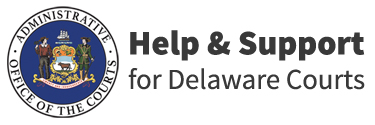Justice of the Peace Court Civil Fees
Updated 11/05/2021
| Justice of the Peace Court Civil Fees (10 Del. C. § 9801) |
Amount
|
|---|---|
| Abandoned Property Suit: Filing Fee |
$45
|
| Abandoned Property Claims: Third/Fourth/Fifth Party Action |
$45
|
| Alias (Second Attempt at Service) |
$20
|
| Attachment in Lieu of Summons |
$20
|
| Constable Sale (Venditiona Exponas) |
$20
|
| Debt Claims where the amount in controversy is less than $1,000: Filing Fee |
$35
|
| Debt Claims where the amount in controversy equals or is between $1,000-$5,000: Filing Fee |
$40
|
| Debt Claims where the amount in controversy exceeds $5,000: Filing Fee |
$45
|
| Debt Claims where the amount in controversy is less than $1,000: Third/Fourth/Fifth Party Action |
$35
|
| Debt Claims where the amount in controversy equals or is between $1,000-$5,000: Third/Fourth/Fifth Party Action |
$40
|
| Debt Claims where the amount in controversy exceeds $5,000: Third/Fourth/Fifth Party Action |
$45
|
| Debt Interpleaders where the amount in controversy is less than $1,000: Filing Fee |
$35
|
| Debt Interpleaders where the amount in controversy equals or is between $1,000-$5,000: Filing Fee |
$40
|
| Debt Interpleaders where the amount in controversy exceeds $5,000: Filing Fee |
$45
|
| Debt Interpleaders where the amount in controversy is less than $1,000: Filing Fee: Third/Fourth/Fifth Party Action |
$35
|
| Debt Interpleaders where the amount in controversy equals or is between $1,000-$5,000: Filing Fee: Third/Fourth/Fifth Party Action |
$40
|
| Debt Interpleaders where the amount in controversy exceeds $5,000: Filing Fee: Third/Fourth/Fifth Party Action |
$45
|
| Distress for Rent Claim |
$60
|
| Distress for Rent Claim: Third/Fourth/Fifth Party Action |
$60
|
| Execution (Wage Attachment/Levy) |
$30
|
| Garage Keeper Case: Filing Fee |
$45
|
| Landlord/Tenant: Filing Fee |
$45
|
| Landlord/Tenant Appeal to 3-Judge Court |
$60
|
| Landlord/Tenant Claims: Third/Fourth/Fifth Party Action |
$45
|
| Motion to Vacate a Default/Nonsuit Judgment |
$15
|
| Replevin Action: Filing Fee |
$55
|
| Replevin Claims: Third/Fourth/Fifth Party Action |
$55
|
| Revival of Judgment (Scire Facias) |
$20
|
| Service of Writ of Summary Possession |
$40
|
| Subpoena |
$10
|
| Transcript |
$10
|
| Trespass Claims where the amount in controversy is less than $1,000: Filing Fee |
$35
|
| Trespass Claims where the amount in controversy equals or is between $1,000-$5,000: Filing Fee |
$40
|
| Trespass Claims where the amount in controversy exceeds $5,000: Filing Fee |
$45
|
| Trespass Claims where the amount in controversy is less than $1,000: Third/Fourth/Fifth Party Action |
$35
|
| Trespass Claims where the amount in controversy equals or is between $1,000-$5,000: Third/Fourth/Fifth Party Action |
$40
|
| Trespass Claims where the amount in controversy exceeds $5,000: Third/Fourth/Fifth Party Action |
$45
|
If the Plaintiff (person who files the case) wins the case, the court may award the court costs (in addition to the principal claim, interest, and other relief requested as a part of the judgment). If the Plaintiff files the case outside of the county where the Defendant (person whom the claim is against) resides, court costs will not be awarded.
How To File An Application For a Waiver of Court Fees
The application for filing a fee waiver is contained below. You may either obtain the necessary forms from the Court or you may download them. All applicants must fill in the Application and Affidavit to Proceed in Forma Pauperis (Civil Form 49). Only persons who have been told by a Delaware Court that they may not file future claims without the permission of the court due to having filed frivolous or malicious litigation, should fill out the second form, the Affidavit of Good Cause (Civil Form 49A).
The application (and the Affidavit of Good Cause, if you are required to file it) must be signed in front of a notary public or a justice of the peace. You should be aware that in signing the application (and the Affidavit of Good Cause, if necessary), you are swearing or affirming, under penalty of perjury, that the information is true and correct. If you wish to sign in front of a notary, and do not know of one, you may find a list of notaries in the yellow pages of the telephone book.
The signed and notarized fee waiver documents should be filed with the Court along with your complaint.
See Income Level for Individuals Eligible for Assistance for the income eligibility guidelines which are used by the Court in determining whether an in forma pauperis application should be granted. When applicants have both income and assets at or below the guidelines, the Court will generally approve the application. At income or asset levels above those shown in the guidelines, the Court will determine whether the applicant has any unusual necessary expenses which may cause the Court to grant the application.
In addition to looking at the applicant's income and asset levels, the Court will review the applicant's complaint to determine whether the action is factually frivolous (baseless, or of no importance), malicious (designed to injure or harass), or legally frivolous (without legal merit). If the complaint fits within any of these categories, the Court will deny the request for the fee waiver and will dismiss the action.

